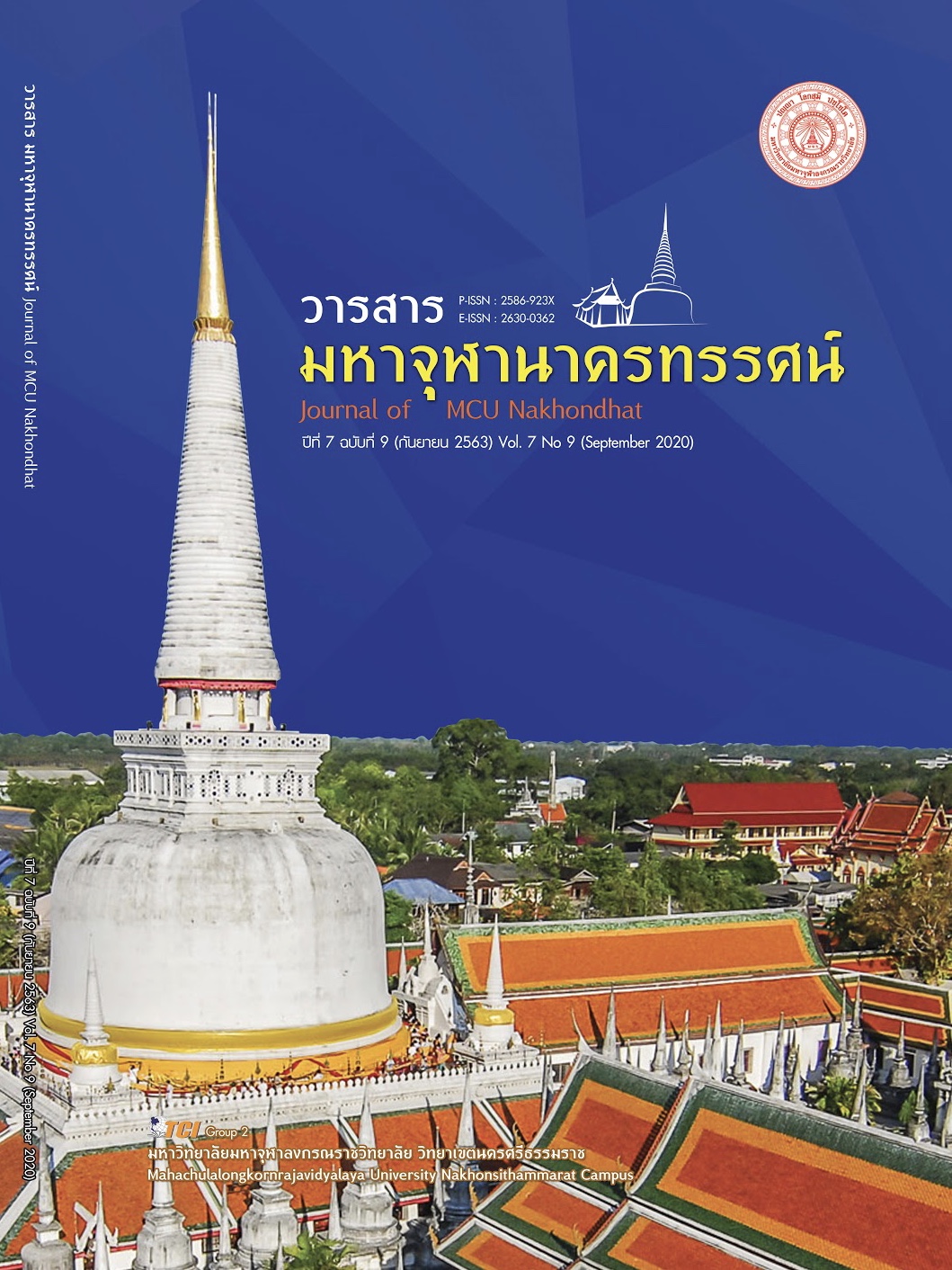NEW NORMAL: EDUCATIONAL ADAPTATION THROUGH BUDDHISM
Main Article Content
Abstract
Education is the important basis of human and nation development in the global society. Humans have to adapt themselves to the modern times. Therefore, education policies in the 21st century, determined by government, are focused on developing humans to have many special skills and abilities as well as be able to adapt themselves to future changes.
In late 2019, COVID – 19 was already spreading in Thailand. This new infectious disease outbreak affected globally people lives. So, they have to adapt themselves to the New Normal society, in which they live differently from the past under social changes. Additionally, this outbreak has affected the whole social structure such as economics and especially, education, in which the strategies and plans have to be created by the Ministry of Education to facilitate learning systems in this crisis. While there are different various questions from societies relating to the stability of technological system, teacher’s readiness, as well as the efficiency of created plans and strategies towards students’ learning achievement. The majority of them considers the new learning method an increase of family expense such as Internet, desktop, or even smartphone. Since kinds of new technologies provide both advantages and disadvantages to humans, students and teachers have to take into consideration. Therefore, during global emergencies, parents should control their children when they are attending online classes. Applying Buddhist teachings in educational enhancement is considered an important factor of improving learners’ sustainable problem – solving skill as well as the ability to understand and learn well.
Article Details
References
กระทรวงศึกษาธิการ. (2545). พระราชบัญญัติการศึกษาแห่งชาติ พ.ศ. 2542 และที่แก้ไขเพิ่มเติม (ฉบับที่ 2) พ.ศ. 2545. กรุงเทพมหานคร: บริษัท พริกหวานกราฟฟิค จำกัด.
จันทนี เจริญศรี. (2563). 7 New Normal ที่อาจได้เห็นในสังคมไทยในวันที่โควิด – 19 หายไป. เรียกใช้เมื่อ 30 มิถุนายน 2563 จาก https://thailand – property – news.knight frank.co.th
นรเชษฐ์ วันวัฒน์สันติกุล. (2560). การพัฒนาระบบสารสนเทศผลการเรียนออนไลน์ กรณีศึกษาโรงเรียนดงมะไฟวิทยา สังกัดสำนักงานเขตพื้นที่การศึกษามัธยมศึกษา เขต 23. วารสารบัณฑิตศึกษา, 14(67), 1-7.
พรศักดิ์ ธรรมนิมิตร์. (2557). วาระนโยบายการศึกษาในศตวรรษที่ 21: นโยบายทางเลือกหรือนโยบายทางรอดของประเทศไทย. วารสารสังคมสาสตร์บูรณาการ คณะสังคมศาสตร์และมนุษย์ มหาวิทยาลัยมหิดล, 1(1), 139-160.
พระเทพเวที (ประยุทธ์ ปยุตฺโต). (2531). หลักการศึกษาในพระพุทธศาสนา. กรุงเทพมหานคร: จุฬาลงกรณ์มหาวิทยาลัย.
พระธรรมปิฎก (ป.อ. ปยุตฺโต). (2538). ธรรมกับการศึกษาของไทย. กรุงเทพมหานคร: สหธรรมิก.
พระบาทสมเด็จพระปรมินทรมหาภูมิพลอดุลยเดช. (2552). คำพ่อสอน: ประมวลพระบรมราโชวาทและพระราชดำรัสเกี่ยวกับเด็กและเยาวชน. (พิมพ์ครั้งที่ 6). กรุงเทพมหานคร: โรงพิมพ์กรุงเทพมหานคร.
พระพรหมคุณภรณ์ (ป.อ. ปยุตฺโต). (2550). คนไทยสู่ยุคไอที. (พิมพ์ครั้งที่ 8). กรุงเทพมหานคร: พิมพ์สวย.
. (2551). ศิลปะศาสตร์แนวพุทธ. (พิมพ์ครั้งที่ 5). กรุงเทพมหานคร: มูลนิธิพุทธธรรม.
. (2552). สยามสามไตร. กรุงเทพมหานคร: พิมพ์สวย.
. (2556). ปรัชญาการศึกษาของไทย ภาคพุทธธรรม: แกนนำการศึกษา ภาคต้นของหนังสือ ปรัชญาการศึกษาของไทย. กรุงเทพมหานคร: ผลิธัมม์.
พระมหาสุทิตย์ อาภากโร (อบอุ่น) และคณะ. (2556). สุขที่ได้ธรรม. นนทบุรี: บริษัท ดีไซน์ ดีไลท์ จำกัด.
พุทธทาสภิกขุ. (2549). การศึกษาสมบูรณ์แบบ: คือวงกลมที่คุ้มครองโลกถึงที่สุด. กรุงเทพมหานคร: อุษาการพิมพ์.
มหาจุฬาลงกรณราชวิทยาลัย. (2539). พระไตรปิฎกภาษาไทย ฉบับมหาจุฬาลงกรณราชวิทยาลัย. กรุงเทพมหานคร: โรงพิมพ์มหาจุฬาลงกรณราชวิทยาลัย.
ยนต์ ชุ่มจิต. (2558). ความเป็นครู. (พิมพ์ครั้งที่ 6). กรุงเทพมหานคร: โอ.เอส. พริ้นติ้ง เฮ้าส์.
ราชบัณฑิตยสถาน. (2556). พจนานุกรมฉบับราชบัญฑิตยสถาน พ.ศ. 2554. (พิมพ์ครั้งที่ 2). กรุงเทพมหานคร: พิมพ์ลักษณ์.
วิลาสินี วัฒนมงคล. (2561). วิกฤตการศึกษาไทยในยุค 4.0. วารสารศึกษาศาสตร์ มมร, 6(1), 427-444.
สมจิต แดนสีแก้ว และคณะ. (2559). ความเสมอภาคและโอกาสการเรียนรู้ตลอดชีวิตสู่การสร้างคุณภาพชีวิต. วารสารราชพฤกษ์, 14(3), 10-17.
สุรพล อิสรไกรศีล. (2563). ราชบัณฑิตบัญญัติศัพท์คำว่า New Normal. เรียกใช้เมื่อ 30 มิถุนายน 2563 จาก https://www.facebook.com/surapol.issaragrisil
PPTVHD36.COM. (2563). เรียนออนไลน์ สะท้อนเหลื่อมล้ำ? กับทางออกการศึกษาไทยในช่วงวิกฤตโควิด – 19. เรียกใช้เมื่อ 30 มิถุนายน 2563 จาก https://www.pptvhd 36.com/news
Sanook.com. (2563). เสียงสะท้อน “เรียนออนไลน์” และความไม่พร้อมของการศึกษาไทยช่วงโควิด – 19. เรียกใช้เมื่อ 30 มิถุนายน 2563 จาก https://www.sanook .com/news/8158203/
ThaiPublica. (2563). ผลกระทบของ COVID – 19 ต่อระบบการศึกษาของโลกและประเทศไทยในมุมมองทางเศรษฐศาสตร์. เรียกใช้เมื่อ 30 มิถุนายน 2563 จาก https://thaipublica.org/2020/04/19 – economists – with – covid – 19 – 15/
Trilling, B. & Fadel, C. (2009). 21st Century Skills Learning for Life in Our Times. Francisco: Jossey – Bass.


